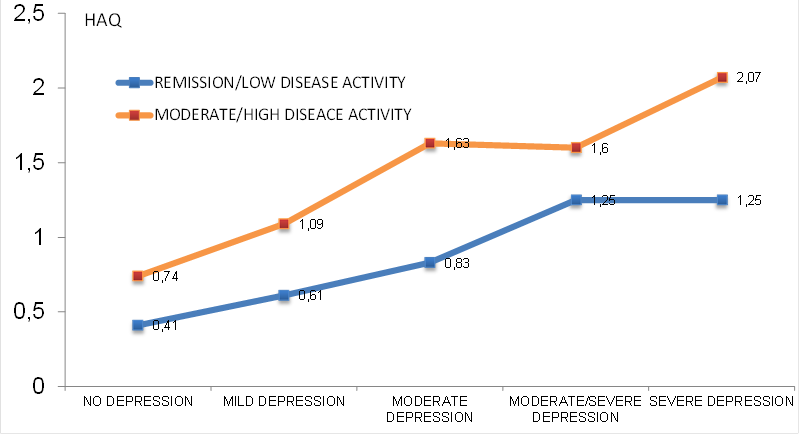Session Information
Date: Monday, October 22, 2018
Title: Rheumatoid Arthritis – Diagnosis, Manifestions, and Outcomes Poster – ARHP
Session Type: ACR Poster Session B
Session Time: 9:00AM-11:00AM
Background/Purpose:
Depression is one of the most frequent comorbidity in RA patients. It´s presence is associated with higher healthcare costs, mortality rate and reduced odds of achieving a good treatment response. The aim of our study was to determine the prevalence of depression in Argentinean patients with RA and to establish its relationship with different sociodemographic and clinical factors.
Methods:
Consecutive patients ≥18 years old, with a diagnosis of RA according to ACR-EULAR 2010 criteria were included. Sociodemographic data (sex, age, work and marital status, physical activity), comorbidities, RA characteristics (disease duration, RF and anti-CCP, presence of erosions), disease activity (joint count (28), composite indexes, pain, patient’s and physician´s global assessment -NVS-, morning stiffness), CRP, ESR and current treatment were registered. Questionnaires were administered to assess quality of life by EQ-5D-3L and QOL-RA, functional capacity by HAQ-A and depression by PHQ-9. Major depression was defined as a PHQ-9 score ≥10. PHQ-9 scores of 5-9, 10-14, 15-19, ≥20 represented mild, moderate, moderate/severe and severe depression, respectively. Patients with difficulties in answering the questionnaires (illiterate, blind) and with decompensated comorbidities were excluded. Statistical analysis: Student´s T, ANOVA and Chi2 tests. Multiple logistic regression.
Results:
258 patients were included. 85.7% were females, with a median (m) age of 54 years (IQR 45-62) and m disease duration of 9 years (IQR 3.6-16.7). Disease activity by DAS28-ESR was m 3.5 (IQR 2.5-4.5). The m PHQ-9 score was 6 (IQR 2-12.3). The prevalence of mayor depression was 33.7%. 66 (25.6%), 42 (16.3%), 27 (10.5%) and 18 (7%) patients presented mild, moderate, moderate/severe and severe depression, respectively. Patients with mayor depression had worst functional capacity (HAQ mean 1.56 ± 0.78 vs 0.69 ±0.65, p 0.0001), poorer quality of life (QOL-RA mean 5.38 ± 1.78 vs 7.31 ±1.61, p 0.0001), more pain (NVS mean 56.15 ± 27.48 mm vs 33.42 ± 25.72 mm, p 0.0001) and higher disease activity (DAS28-ERS mean 4.33 ±1.39 vs 3.3 ± 1.28, p 0.0001). Unemployment, presence of comorbidities, and less physical activity were more frequent in this group. No differences between early arthritis patients (≤ 2 years) and established rheumatoid arthritis (> 2 years) were seen. In the multivariate analysis, worst functional capacity and quality of life were independently associated to the presence of mayor depression. Patients with moderate and severe depression had worse functional capacity, independently of disease activity. (Fig.1)
Conclusion:
The prevalence of mayor depression measured by PHQ-9 score in this Argentinean cohort of rheumatoid arthritis patients was 33.7%. Patients with depression had a significant impact on functional capacity and quality of life regardless of disease activity.
To cite this abstract in AMA style:
Isnardi CA, Capelusnik D, Schneeberger EE, Bazzarelli M, Barloco L, Blanco ES, Benitez A, Benavidez FL, Scarafia S, Lázaro MA, Perez-Alamino R, Colombres F, Kohan MP, Sosa J, Gonzalez Lucero L, Barbaglia AL, Maldonado Ficco H, Citera G. Depression Is a Major Driver of Functional Capacity in Patients with Rheumatoid Arthritis Regardless of Disease Activity [abstract]. Arthritis Rheumatol. 2018; 70 (suppl 9). https://acrabstracts.org/abstract/depression-is-a-major-driver-of-functional-capacity-in-patients-with-rheumatoid-arthritis-regardless-of-disease-activity/. Accessed .« Back to 2018 ACR/ARHP Annual Meeting
ACR Meeting Abstracts - https://acrabstracts.org/abstract/depression-is-a-major-driver-of-functional-capacity-in-patients-with-rheumatoid-arthritis-regardless-of-disease-activity/

